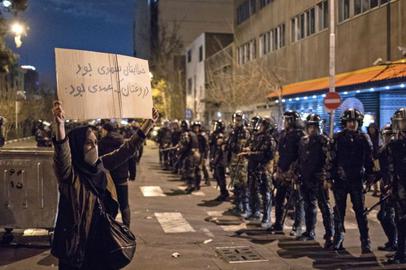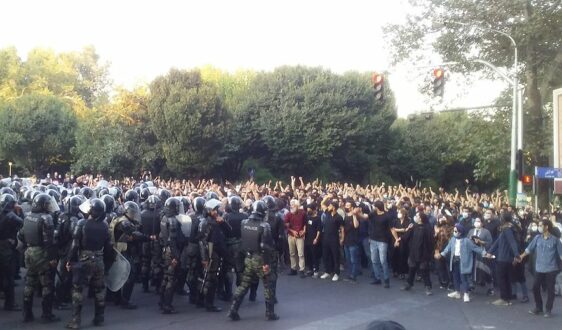Iranwire –

Day 1-
“Today we went to Tehran Pars (eds: a city in Greater Tehran). We got there at 5 p.m. and stayed until 8:30. It was getting too cold. People just kept walking but sometimes a small group gathered and started chanting slogans. And the cars were honking their horns. Interestingly, when the herd of motorcyclist agents arrived people did not run. Instead, they continued walking and told those of us who wanted to run to ‘walk normally.’ People did not give a damn about them. In front of the mosque between the first and second squares, which is the agents’ nest, they had tied four people to the poles in front of the store. They had blindfolded those four like they were POWs and people cursed the agents when they saw them. A lady and I stepped forward, but we couldn’t do anything. The agents shouted at us and shoved a man. One of the agents said, ‘We cannot touch the women!’ And I said, ‘Yeah, you don’t touch them; you rape them’!”
The narrator is a 35-year-old woman who works for a private company. She excitedly tells us about the first day of strikes and three days of protests: “There was a group of agents over there who spoke with each other in Arabic to frighten people. Only their eyes were visible. One of them told the other one in Arabic: ‘We love Iranians’!”
This was intriguing. I asked her to describe these agents more precisely. “They were burly and tall, wearing simple Khaki outfits without any patterns. Their equipment was black and they were wearing light green masks”, she said.
Earlier, a trusted member of the military had told me about this outfit of the Iraqi paramilitary group al-Ḥashd ash-Shaʿbi, or Popular Mobilization Forces, whose members presumably have been dispatched to Iran, although there is no evidence to prove this claim. “Have no doubt that all groups that are paid by the Islamic Republic will participate in this war,” he told me.
I wonder what the duty of the Iranian army is, if a foreign military force comes to Iran and slaughters its people. The country’s budget is spent on forces that do nothing except stay silent and watch. Of course, a while ago, a top army commander complained that the military paramedics were not doing their job in controlling the unrest!
Day 2:
Today, I accompanied the same lady to witness the uprising in Tehran Pars. Two of her friends joined us on the way. For their safety, I would call all three “Mahsa”. Mahsa 1 was driving the car and whenever there was traffic, she would blow the horn as a sign of protest. Some cars joined us, some didn’t.
Mahsa 2 said she was afraid to join the rallies because of rumors according to which arrested women had been raped. But, as she put it, she has not been cowed and she believes there is no other way to fight.
The two Mahsas were happily shaking their heads out of the window. When the other cars saw them doing this, they blew their horns and waved their hands. A little later a Special Police Patrol’s Mercedes passed by. The two Mahsas sat back but, right at that moment, a hand emerged from the police car with two fingers making the victory sign.
Seeing this, the girls screamed in joy and followed the police car. Its passengers were two police officers and two soldiers. I begged Mahsa 1 to leave these poor guys alone and to stop following them.
A little later we got out of the car and started walking between Tehran Pars’ first and second squares. In two places on the pavement garbage cans were burning. Teargas was overpowering along the way. When we were still in the car, a person on a motorcycle bearing the logo of the delivery service Miare Company invited us to honk. A little later, I saw him park his motorcycle next to plainclothes agents and joined them. An odd behavior I had witnessed earlier on Haft Hoz Square as well. Apparently, they wanted to identify the protesters even before they joined rallies.
We decided that I and Mahsa 3, who was a bit afraid, would walk behind the two other Mahsas, who had more fire in them. A few seconds later a group of motorcyclists with batons and paintball guns drove onto the sidewalk and started shouting: “Go, go, go away…wrap it up…go to your homes.”
A woman who had no idea of what was going on came out of her home. When a paintball hit the pavement in front of her, she moved backward and fell to the ground on her back. Pellets ricocheted off the pavement and rattled against the wall. I put my arms around Mahsa 3. We tried to run but the teargas did not let her breathe. Her face was all tears and sweat behind the mask. We could not find our friends.
A few minutes later we reached the intersection. There, the motorcyclists turned back and drove to the opposite sidewalk. Their mission was apparently to empty out this street and the neighborhoods around it where the clashes in their alleyways were more serious. People chanted slogans from their homes and the sound of gunfire would not cease. On the other side of the crossroad, we waited for the other Mahsas. Twice, we met groups of young women who raised their fists and gave us chocolate and a paper with the words “Woman, Life, Freedom”.
Day 3:
I am worried about the Mahsas. At night, I send Mahsa 1 a message on Telegram and ask her: “Did you go to Tehran Pars today? What was going on?”
“Tonight, we went there late and could not stay for long,” she answered. “They were beating [protesters] savagely. Tir-Andaz Crossroad was filled with agents. The interesting thing is that the plainclothesmen who always ride heavy motorcycles were this time riding Honda CGs. My friend suffers from asthma and the teargas made her sick. She went back and sat in the car. Soon, we also went back to the car but the moment we wanted to leave the bastards attacked and broke my car’s windshield. We reciprocated by chanting slogans. They beat a girl to a pulp in front of us. She wanted to defend us and told them, ‘Why are your breaking the car’s window?’ They beat her so bad that I thought she was dead. Fortunately, she got up. They even beat a 10-year-old child. Then, before my mother notices the broken windshield, I immediately bought a new one. Every place was closed, and we had to go as far as Golshan (eds: a neighborhood in east Tehran Pars). The windshield cost us 270,000 tomans. When we returned, there were no pedestrians. People were in cars and honking. Motorcyclists waving a flag were going back and forth along the street to show they had won. A Basiji told us, ‘You seditionists, go home’!”
 Shabtabnews In this dark night, I have lost my way – Arise from a corner, oh you the star of guidance.
Shabtabnews In this dark night, I have lost my way – Arise from a corner, oh you the star of guidance.



